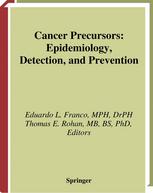

Most ebook files are in PDF format, so you can easily read them using various software such as Foxit Reader or directly on the Google Chrome browser.
Some ebook files are released by publishers in other formats such as .awz, .mobi, .epub, .fb2, etc. You may need to install specific software to read these formats on mobile/PC, such as Calibre.
Please read the tutorial at this link: https://ebookbell.com/faq
We offer FREE conversion to the popular formats you request; however, this may take some time. Therefore, right after payment, please email us, and we will try to provide the service as quickly as possible.
For some exceptional file formats or broken links (if any), please refrain from opening any disputes. Instead, email us first, and we will try to assist within a maximum of 6 hours.
EbookBell Team

4.3
78 reviewsDramatic advances in our understanding of cancer causation have come from epidemiologic and laboratory research, particularly over the past two decades. These developments have included a broadening interest in the critical events that take place during the early stages of the dynamic multistep process leading to - vasive cancer. Increasingly, cancer epidemiologists are pursuing research into the origins and natural history of premalignant lesions, including intermediate or surrogate endpoints, a trend - celerated by the development of molecular technologies that are revolutionizing our understanding of the transformation of normal to malignant cells. There seems little doubt that this emerging knowledge will provide further insights not only into carcinogenic processes, but also into more sensitive methods of early detection and more effective means of prevention. In this book, Drs. Franco and Rohan have succeeded in prep- ing a comprehensive, timely, and critical review of the substantial progress that has been made in our understanding of cancer p- cursors. They have enlisted experts in the ?eld who have c- tributed authoritative chapters on the precursors to a wide variety of cancers,with emphasis on etiology and natural history,including the role of environmental and heritable factors that provoke normal cells to undergo malignant transformation. Epidemiologic data are linked whenever possible to molecular as well as classical cellular pathology, providing a fuller understanding of the causal events and mechanisms that initiate the carcinogenic process.